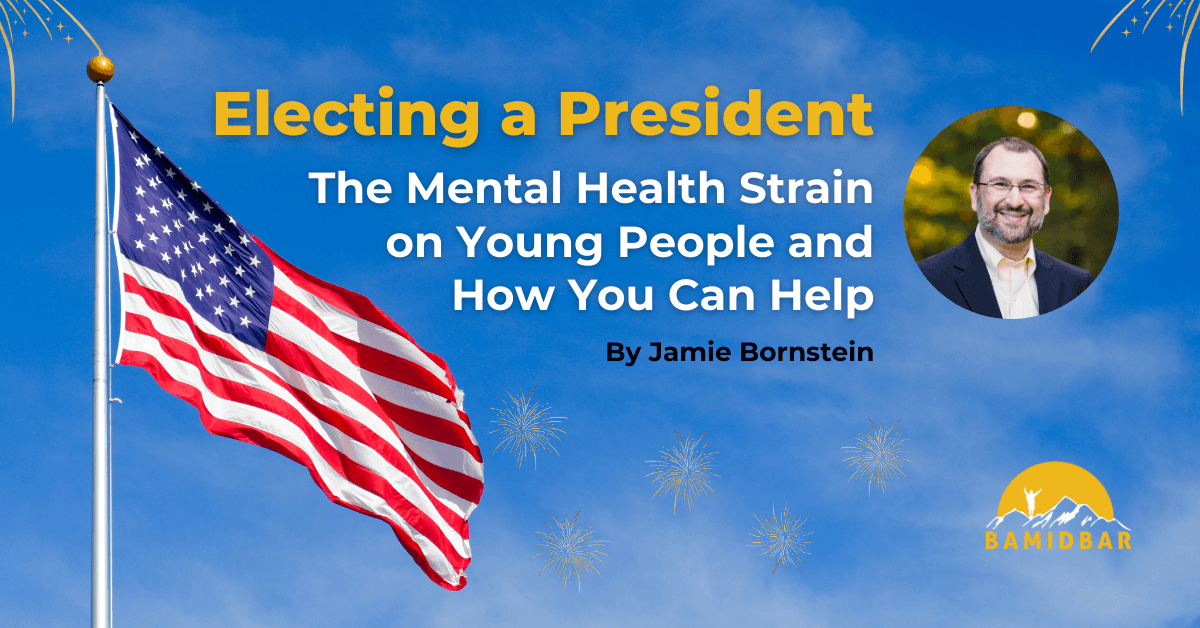By Jamie Bornstein
It’s amazing how starkly different my early experiences with politics in the 80s and 90s were compared to what teens and young adults are experiencing today.
Presidential campaigns were exciting, in a good way. We were not just selecting someone to lead the country, we were also, across political divides, collectively celebrating the ritual that most fundamentally made America America: the right to vote in free and fair elections.
Patriotism belonged to everyone, because it was not about who you voted for, it was about voting itself.
I can’t imagine how foreign this must sound to teens and young adults today, so many of whom are experiencing intense anxiety and fear related to this election. And it’s not just anxiety about who wins, it’s anxiety about what happens next.
I grew up in Manchester (ManchVegas to the locals), the largest city in New Hampshire, with a population of 100,000+. New Hampshire is famously known as the “first-in-the-nation” state, because, since 1920, it has always held the first presidential primaries. (Yes, there’s Iowa, but those are caucuses. It’s, like, a totally different thing. Duh.)
Oh, and before I continue, yes, there are, in fact, Jews in New Hampshire. But I digress.
As a small state that plays an outsized role in presidential elections, I grew up with intimate access to the candidates. One could shake hands with any of them, Republicans and Democrats, without much effort, and we did.
Still, it’s not the close proximity to the candidates themselves that stands out in my memory. What stands out is the upbeat mood that surrounded the primaries and the general election. Getting swept up in it was fun. We collected campaign buttons, candidates spoke at our schools, we could easily attend rallies, and at 6:30 pm we watched Peter Jennings deliver the national news, tickled to see clips of candidates having lunch in our local diners.
It was more festive than contentious. We learned so much, including the ability to debate with peers in person, eye-to-eye and to agree to disagree. We never lost friends because of differing political views.
Most importantly, we had plenty of room to safely experiment with different political beliefs and values while in search of our own. There was no social pressure, not litmus testing. It felt organic. American. Nothing about the process, or the results, was laced with fear. Disappointment, yes. Fear, not at all.
I went to the polls for the first time on November 5, 1996 and pulled the lever (literally) for Bill Clinton just six months after my 18th birthday. I felt hopeful, idealistic, comfortable with politics, positively engaged, and self-confident about the authenticity of my emerging political identity.
I’m doubtful that young people feel anything like this today and I worry about what that means for their day-to-day mental health; what it does to a person to grow up in such a polarized, antagonistic, zero-sum political milieu. It’s not good.
I urge you to check in with the young people in your lives tomorrow and over the coming weeks. Make sure they know about BaMidbar, and other mental health resources that they can access if the weight of politics is negatively impacting their lives, especially if you see concerning signs, such as seeing them lose interest in the activities and people they love.
You might be inclined to help them by trying to convince them to think or act differently.
Don’t.
Feelings live in a realm that extends beyond thoughts and actions. Feelings, good or bad, cannot be judged, they simply exist within us. They are real to the person feeling them.
All you need to do is simply affirm the reality of their feelings. Affirmation is not an endorsement. Affirmation is empathy. It is simply giving someone in pain what is perhaps the most important foundation on which you can truly begin to offer help: the sense of safety and trust that comes with being seen and believed.
May the elections of 2024 open the doors to brighter times, not just for young people, but for us all.
Jamie Bornstein is the Chief Advancement Officer at BaMidbar. His bio can be found here.

